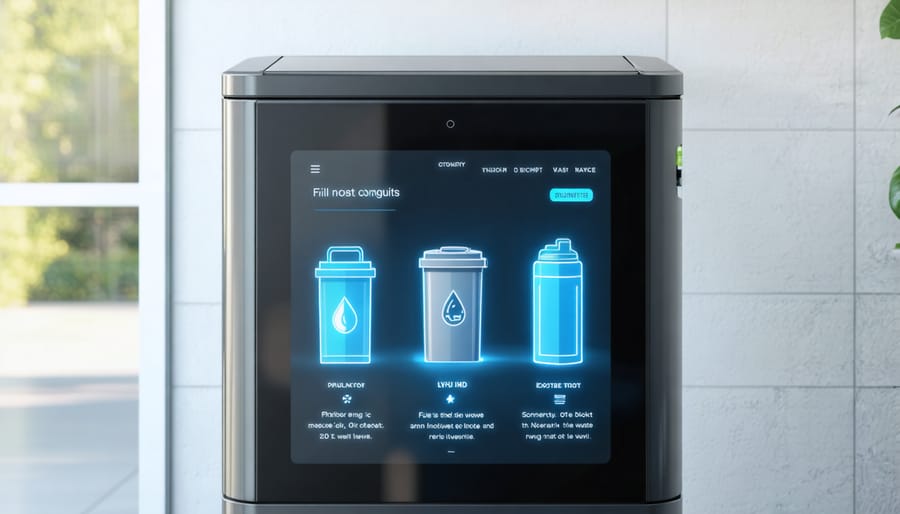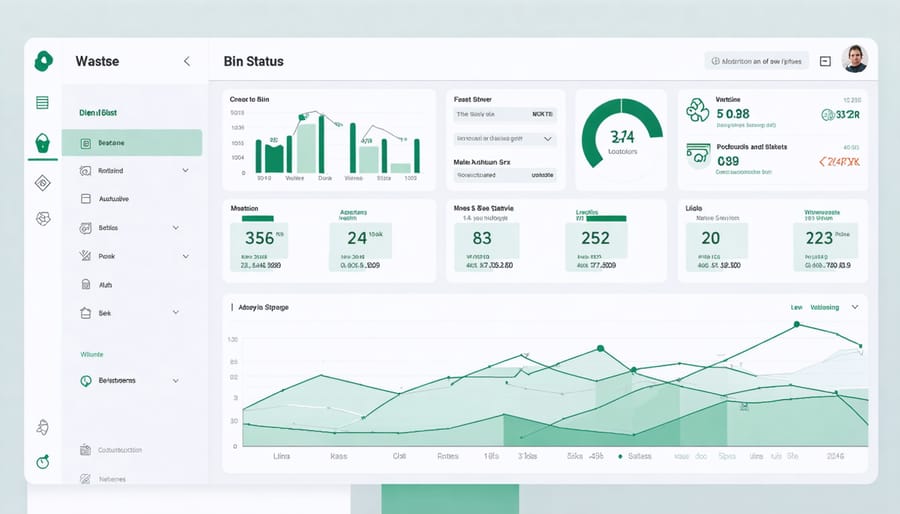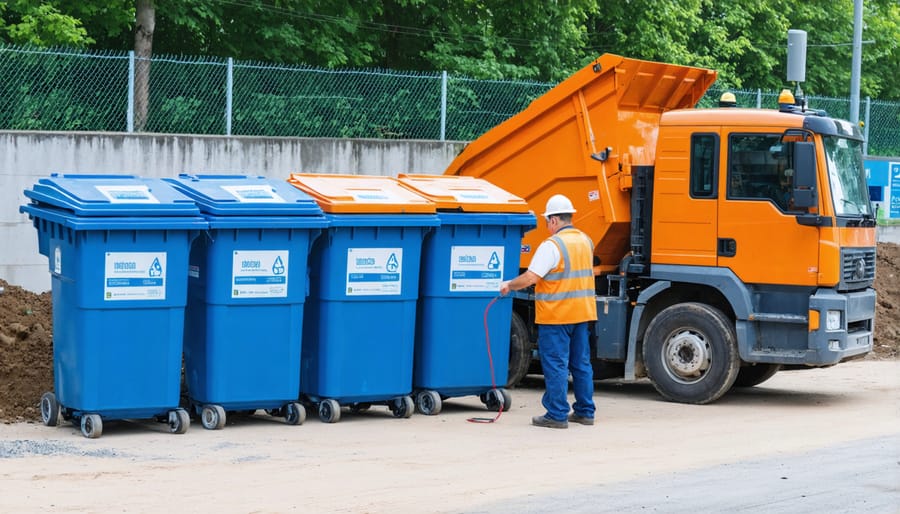Smart waste bins are transforming construction site efficiency alongside other emerging smart construction technologies, delivering unprecedented control over waste management operations. These IoT-enabled containers leverage real-time monitoring systems to optimize collection schedules, reduce operational costs by up to 30%, and ensure regulatory compliance through automated documentation. For construction project managers facing increasing pressure to improve sustainability metrics and operational efficiency, smart waste bins offer a data-driven solution that integrates seamlessly with existing site management systems. By combining fill-level sensors, automated sorting capabilities, and cloud-based analytics, these advanced waste management systems enable construction teams to make informed decisions about waste handling while maintaining strict environmental standards. The technology’s ability to provide detailed waste analytics and predictive maintenance alerts represents a significant leap forward in construction site waste management, offering both immediate operational benefits and long-term strategic advantages for forward-thinking construction firms.
The Technology Behind Smart Waste Bins
Sensor Integration and IoT Connectivity
Modern smart waste bins incorporate advanced sensor technology and IoT integration and monitoring capabilities that revolutionize waste management in construction projects. Ultrasonic fill-level sensors, positioned at strategic points within the bins, continuously measure waste accumulation and provide real-time data to facility managers. These sensors typically achieve accuracy rates of 95-98% in volume detection, enabling precise capacity monitoring.
The connectivity infrastructure relies on low-power wide-area networks (LPWAN) such as LoRaWAN or NB-IoT, ensuring reliable data transmission while minimizing power consumption. Smart bins operate on long-life batteries lasting 3-5 years, with solar-powered options available for outdoor applications. The data collected is transmitted to cloud-based platforms, where advanced analytics process information about fill levels, collection patterns, and waste generation trends.
Real-time monitoring capabilities enable predictive maintenance and optimize collection routes, reducing operational costs by up to 30%. The system generates automated alerts when bins reach predetermined capacity thresholds, typically set at 75-80% full, allowing for timely intervention. Integration with building management systems (BMS) ensures seamless operation within the broader smart building ecosystem, while API compatibility enables connection with existing waste management software platforms.
Construction sites implementing these systems report significant improvements in waste handling efficiency, with some projects achieving a 40% reduction in collection frequency while maintaining optimal service levels.

Data Analytics and Reporting Systems
Modern smart waste bins integrate sophisticated data analytics and reporting systems that transform waste management into a data-driven operation. These platforms collect and analyze real-time data from sensors, providing valuable insights for construction site managers and waste handling teams.
The analytics systems typically feature customizable dashboards that display key metrics such as fill levels, collection frequencies, and waste segregation compliance. Advanced algorithms process this data to generate predictive models for waste generation patterns, enabling proactive planning of collection routes and resource allocation.
Real-time monitoring capabilities allow project managers to track multiple bins across different construction sites simultaneously. The systems generate automated alerts when bins reach predetermined fill levels, helping prevent overflow situations and maintaining site safety standards.
Reporting functionalities include detailed waste audit trails, environmental impact assessments, and compliance documentation. These reports are particularly valuable for LEED certification requirements and environmental regulations compliance. The systems can also track recycling rates and waste diversion metrics, supporting sustainability goals and regulatory reporting.
Integration capabilities with existing construction management software ensure seamless data flow between different operational systems. Many platforms offer API connectivity, allowing construction companies to incorporate waste management data into their broader project management frameworks.
Analytics tools also provide cost analysis features, helping companies optimize their waste management budgets by identifying inefficiencies and opportunities for cost reduction. This data-driven approach enables construction firms to make informed decisions about waste handling procedures and resource allocation.

Implementation Benefits for Construction Sites
Cost Reduction and Resource Optimization
Smart waste bins deliver significant cost reductions through multiple operational channels, making them an attractive investment for construction projects. Analysis of implementation data from major construction sites reveals that these systems typically achieve a 30-40% reduction in waste management costs within the first year of deployment.
The primary cost savings stem from optimized collection schedules based on real-time fill-level monitoring. Instead of fixed collection routes, waste management teams can prioritize bins that actually require servicing, reducing unnecessary trips and labor hours. Construction sites implementing smart waste solutions report an average 45% decrease in collection frequencies, translating to substantial fuel and maintenance savings.
Resource optimization extends beyond direct waste management. Smart bins’ automated sorting capabilities significantly improve recycling rates, typically by 25-35%, reducing landfill fees and potentially generating revenue through the sale of properly sorted recyclable materials. The system’s data analytics enable project managers to identify waste patterns and adjust material ordering accordingly, minimizing excess purchases and storage costs.
A notable case study from a major commercial development project in Toronto demonstrated annual savings of $87,000 through smart bin implementation. The project achieved these results through reduced collection frequency, improved recycling rates, and optimized material purchasing based on waste analytics.
Labor efficiency also improves markedly, with waste management staff spending 60% less time on manual monitoring and reporting tasks. The automated monitoring and reporting features free up personnel for more critical construction activities, improving overall project productivity.
When calculating ROI, construction managers should consider both immediate operational savings and long-term benefits, including reduced environmental compliance costs and improved sustainability metrics, which increasingly impact project valuations and stakeholder relationships.
Environmental Compliance and Sustainability
Smart waste bins play a crucial role in helping construction companies meet increasingly stringent environmental regulations while advancing sustainable construction practices. These intelligent systems facilitate precise waste segregation and tracking, enabling contractors to demonstrate compliance with local and national waste management regulations more effectively.
The technology’s automated monitoring capabilities generate detailed reports on waste volumes, types, and disposal methods, streamlining environmental compliance documentation and reducing the risk of regulatory violations. Real-time data collection helps project managers maintain accurate environmental impact assessments and waste diversion rates, essential metrics for green building certifications like LEED and BREEAM.
Smart bins contribute significantly to reducing the construction industry’s environmental footprint through improved recycling rates and waste reduction. The precision of waste sorting enabled by these systems typically increases material recovery rates by 30-40%, minimizing landfill disposal. Integrated sensors optimize collection schedules, reducing unnecessary vehicle trips and associated carbon emissions.
Cost analysis from multiple construction sites indicates that implementing smart waste management systems can lead to a 25% reduction in waste handling costs while improving sustainability performance. The technology’s ability to identify waste patterns allows companies to adjust procurement practices and material handling procedures, preventing excess waste generation at the source.
Through enhanced tracking and analytics, smart waste bins provide valuable insights for developing more effective waste minimization strategies, supporting both environmental compliance and corporate sustainability goals. This data-driven approach enables construction firms to demonstrate their commitment to environmental stewardship while maintaining operational efficiency.

Case Study: Smart Bins in Action
The Olympia Development Project in downtown Seattle serves as a compelling example of smart waste bin implementation in large-scale construction. During this $280 million mixed-use development project, the general contractor, Turner Construction, deployed a network of 24 smart bins across the 3.2-acre site in 2022, yielding remarkable results in waste management efficiency and contributing to improved construction sustainability metrics.
The smart bins, equipped with fill-level sensors and waste analytics software, were strategically positioned at key waste generation points, including material cutting stations, demolition zones, and worker break areas. Each bin featured automatic compaction capabilities and real-time monitoring systems, enabling precise tracking of waste volumes and types.
Within the first six months of implementation, the project achieved:
• 42% reduction in waste collection trips
• 35% decrease in overflow incidents
• 28% improvement in waste segregation accuracy
• $67,000 in direct cost savings from optimized collection schedules
Project Manager Sarah Chen notes, “The smart bins’ real-time alerts prevented overflow situations that previously caused safety hazards and cleanup delays. The data analytics helped us identify waste patterns and adjust our material ordering accordingly, reducing overall waste generation by 23%.”
The system’s integration with the project’s digital infrastructure allowed for automated reporting and documentation, streamlining compliance with local waste management regulations. The bins’ solar-powered operation eliminated the need for external power sources, while their cloud-connected status enabled remote monitoring and predictive maintenance.
A particularly innovative aspect was the implementation of QR code scanning for specialized waste streams, ensuring proper disposal of hazardous materials and maintaining detailed chain-of-custody records. This feature proved crucial during regulatory inspections and contributed to the project’s LEED certification requirements.
The success of this implementation led Turner Construction to standardize smart bin deployment across their Pacific Northwest projects, establishing a new benchmark for construction waste management efficiency. The data collected continues to inform waste reduction strategies and has become an integral part of their sustainability reporting framework.
Integration with Existing Waste Management Systems
Integrating smart waste bins into existing waste management systems requires a systematic approach that considers both technological compatibility and operational efficiency. Construction companies must first assess their current waste management infrastructure and identify potential integration points for smart bin technology.
The primary step involves evaluating the existing waste collection routes and schedules. Smart bins can be programmed to align with these established patterns while optimizing them through real-time fill-level monitoring. This allows waste management teams to adjust collection frequencies based on actual needs rather than fixed schedules.
Data integration is crucial for seamless operation. Modern smart bins utilize standardized APIs and communication protocols that can interface with existing waste management software systems. This ensures that fill-level data, maintenance alerts, and collection analytics are properly transmitted to central management platforms.
For successful implementation, companies should establish a phased rollout approach:
1. Initial pilot program in high-traffic areas
2. Data collection and system optimization
3. Gradual expansion to additional construction sites
4. Full integration with existing fleet management systems
Maintenance protocols must be updated to include smart bin-specific requirements. This includes regular sensor calibration, battery replacement schedules, and network connectivity checks. Training programs should be developed for waste management personnel to handle both traditional and smart bin operations effectively.
Companies must also consider their existing waste sorting and recycling programs. Smart bins can be configured to support multiple waste streams while maintaining separate tracking for each category. This enables more accurate reporting and compliance with environmental regulations.
Cost considerations should include not only the initial hardware investment but also ongoing system maintenance, data management, and potential upgrades to existing infrastructure. However, the long-term benefits often justify these investments through reduced operational costs and improved resource allocation.
To ensure system reliability, redundancy measures should be implemented, including backup communication channels and fail-safe mechanisms that allow bins to operate even if network connectivity is temporarily lost.
Smart waste bins represent a significant leap forward in construction waste management, offering tangible benefits that extend beyond simple waste collection. As demonstrated throughout this analysis, these innovative solutions provide real-time monitoring capabilities, optimize collection routes, and substantially reduce operational costs while supporting sustainability initiatives.
The implementation of smart waste management systems has shown remarkable results across various construction projects, with many firms reporting up to 30% reduction in collection costs and significant improvements in waste sorting efficiency. These outcomes underscore the technology’s potential to transform traditional waste management practices in the construction industry.
Looking ahead, the future of smart waste bins appears increasingly promising. Emerging developments in IoT technology and artificial intelligence are expected to further enhance their capabilities, enabling more sophisticated data analytics and predictive maintenance features. Industry experts anticipate integration with building information modeling (BIM) systems and other construction management platforms, creating a more comprehensive approach to project waste management.
For construction professionals considering the adoption of smart waste solutions, the initial investment is increasingly justified by long-term cost savings and environmental benefits. As regulations around construction waste become more stringent and sustainability requirements more demanding, smart waste bins will likely become a standard feature of modern construction sites.
The construction industry’s continued evolution toward digital transformation makes smart waste bins not just an innovative solution, but an essential tool for future-focused projects and sustainable building practices.

